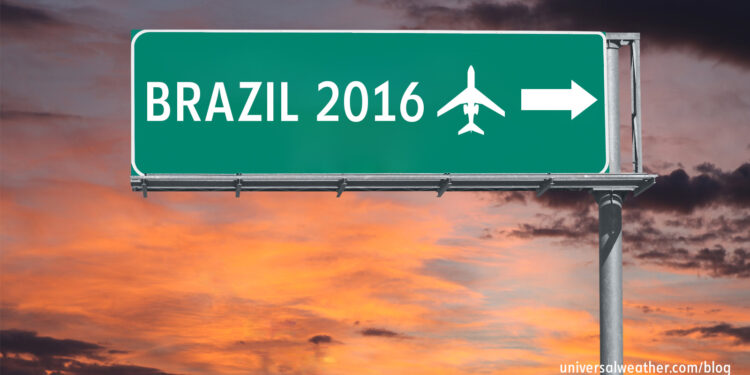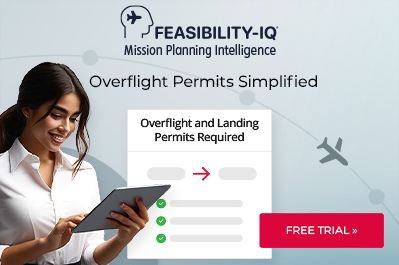Preparing for the Brazil Summer Games – Part 2: Permits, Slots, and Operating Restrictions

This is a post by authors Marcia Taue and Adonis Bastos. Marcia and Adonis are based at Universal Aviation Brazil, which has aircraft ground handling facilities in Sao Paulo, Brasilia, Manaus, Sorocaba, and Rio de Janeiro. Marcia and Adonis are experts on business aircraft operations in Brazil and can be contacted at marciataue@universalaviation.aero or adonisbastos@universalaviation.aero.
This business aviation blog post continues from our article last week, entitled “Preparing for the 2016 Brazil Summer Games – Part 1: Airports and Services.”
The 2016 Brazil Summer Games will be held in Rio de Janeiro on August 3-21. This will be followed by the Paralympic Games, held in Rio de Janeiro September 7-19. Last week, we discussed planning for airports and ground services. In this article we will discuss permits, airport slots and operating restrictions. If you only take away one thing from this article, it is this: If you plan on operating to Brazil during this event period, start no later than six months in advance!
The following is an overview of what you need to know:
1. Brazil landing permit requirements
Landing permits are required for all private non-revenue and charter (non-scheduled commercial) operations to Brazil. If you’re making just one stop in Brazil, you’ll only need a landing permit, but if you’re making more than one stop – even for a tech stop – a domestic permit needs to be obtained instead.
2. Domestic permits
Both landing and domestic permits are processed by Agencia Nacional de Aviacao Civil (ANAC). While landing permits are issued in advance, domestic permits do not become active until customs validates the permit upon first entry into Brazil. And even though your domestic permit request may have been approved for a certain number of days (up to a max of 60 days), local customs officials may change the validation period when you arrive in Brazil. Local customs decisions always supersede ANAC approvals. Also, be aware that if you have a domestic permit and leave the country you’ll need to apply for a new landing and domestic permit to enter Brazil again (if you are going to be making multiple stops in the country). This is a consideration for operators who reposition outside Brazil during the busy Summer Games period. Additionally, domestic permits must be obtained before airport slots can be requested for onward destinations.
3. Permit lead times
The closer to the event you request permits, the longer the permit lead time will be. This is due to increased permit demands on ANAC resources. Even though legislation indicates that permit lead time is 24 hours, we’ve found that it can take 48 hours to obtain permits for Brazil. For permit requests closer to the time of the Summer Games, however, lead times could be five days or more. ANAC operates 24/7, but there are fewer personnel available on weekends/holidays, and permit processing during the off-hours typically takes longer.
4. Permit documentation
For Brazilian landing and domestic permits, the following information or documentation must be provided:
- airworthiness and registration certificates
- worldwide insurance
- licenses and medicals for all crew members
Be mindful that documents submitted for permits must be valid for the duration of your stay in Brazil. If not, permit processing will be delayed until updated information is submitted.
5. Slots/parking considerations
To request airport slots, it’s necessary to register on a website, and this process usually takes 24 hours to complete. During the World Cup event in Brazil last year, slots were not particularly difficult to obtain as the primary issue for operators was parking. For the Summer Games it’s not yet determined if airport slots will serve to confirm parking or not. Scheduled commercial operations will have first slot priority during the Summer Games period and may be able to obtain these months in advance. General Aviation (GA), on the other hand, will have slot requests confirmed no earlier than one month out.
6. Slot requirements
Most airports in Brazil will likely follow the same slot process that was in place for last year’s World Cup event. Authorities have not yet made a final decision on the slot requirements, but slots will probably be required only at the main airports of the cities hosting the games. This means that you’ll need to obtain landing permits before slots can be requested. This is because a landing permit number is required to process any slot request as it’s a required field via the online slot request process.
7. Cabotage considerations
Particularly for charter operations, it’s important to be mindful of cabotage issues. Charter operators should avoid making ferry flights within the country and refrain from picking up and transporting passengers on intra-Brazil flights. This may be viewed by local customs authorities as cabotage. It’s best that charter flights either carry the same passengers on all legs or drop off/pick up international passengers in Brazil and then leave the country. If you ferry into Brazil empty, pick up passengers, drop them off at another destination in Brazil, and then leave empty, this can be viewed as cabotage. For private flights, it’s recommended that a signed letter, on company letterhead, be carried onboard stating the relationship between the lead passengers and the operator. Be mindful that the local customs agent, on day of arrival, will make a final determination if there’s been a cabotage infraction or not. For more information on cabotage in Brazil, please see our article titled “Business Aviation Trip Planning Tips: Cabotage in Brazil.”
8. Trip planning to the Summer Games – Start at least six months in advance!
It’s recommended that if you are planning to operate into Brazil during the 2016 Summer Games, you need to submit your schedule at least six months in advance. Be sure that documentation submitted for permits and slots is valid for the entire period of your stay in Brazil. That way, your 3rd-party provider and ground handler will be able to start working on permits and apply for slots the moment the slot request website opens for GA.
9. Diplomatic flight information
Any diplomatic flights operating to the 2016 Brazil Summer Games must go through official channels for all permits and permit revisions. Note that 3rd-party providers and ground handlers in Brazil will not be able to assist with any diplomatic permits/revisions.
Conclusion
Scheduled commercial airlines will have first priority to slots months in advance, while GA operators will have fewer options and be given access to request them approximately one month prior to the event. Be mindful of the landing and domestic permit requirements, and ensure that the documentation is valid for the length of your stay in the country. Also, be aware of cabotage considerations for Brazil, especially for charter operators.
Brazil can be a complex operating environment, and our team at Universal Aviation Brazil – Rio de Janeiro is here to help.
Questions?
If you have any questions about this article or would like assistance planning your trip to the Summer Games, contact Marcia at marciataue@universalaviation.aero or Adonis at adonisbastos@universalaviation.aero.
Universal Weather and Aviation, Inc. is not a sponsor or in any way affiliated with the Rio 2016 Olympic and Paralympic Games.




